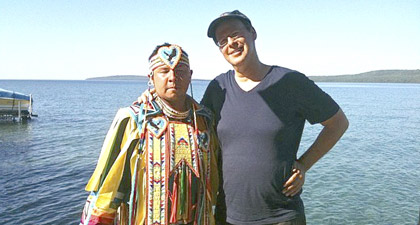TORONTO — Eli Rubenstein is being honoured on Nov. 11 for his many years of dedication to the Jewish community, and his synagogue, Congregation Habonim.
His synagogue is bestowing the honour in the 25th year of Rubenstein’s service as a spiritual leader to the congregation, along with recognizing the long service of Cantor Esther Ghan-Firestone and her accompanist Larry Clements.
“Eli’s a true Jewish leader, and because of his longevity in the shul, I think the congregation felt it was appropriate,” said Avrum Rosensweig, associate religious leader for Congregation Habonim.
Rosensweig called him a bit like the pied piper in the way he attracts the people he meets.
“He’s a very funny person, and I think when he works with young people and adults, he brings out the best in them,” he said.
Rubenstein, who has worked with many bar and bat mitzvah students over the past several decades, said he loves to work with young people to inspire them and help their reach their full potential.
“In my life, I often meet people who don’t realize the potential and ability they have,” he said. “How wonderful it is to help them grow into the person they don’t necessarily know they can be.”
Twenty-five years ago, then-president of Habonim, Gangolf Herman, did the same to him. The rabbi at the time had announced his resignation, and so Herman begged Rubenstein to take over the synagogue, telling him it was his duty and responsibility given that Holocaust survivors built the synagogue, and they feared without Rubenstein’s help, the synagogue would disappear, Rubenstein said.
He agreed to help out until they found someone more permanent. But 25 years later, he’s still there. “I realized that I was able to fashion a kind of Judaism that worked for me and the community,” he said. “We’ve created a very safe space for people of a variety of backgrounds.”
He said inclusiveness is incredibly important to his life, and his synagogue.
“There’s enough strife and criticism and pettiness outside, let’s not take that into the synagogue,” he said.
That’s an attitude he’s held through all areas of his life, Rosensweig said. “Eli seems to cross all boundaries. I’m not sure how he does that, but I don’t think he sees lines between people.”
For example, he has integrated himself into the community on Christian Island, where he owns a house. The island, located in Georgian Bay, is mostly inhabited by First Nations people.
Bonnie Sylvester lives on the island, and has known Rubenstein for about five years. She said he is very hospitable, allowing people to stay in his home whenever they need it, noting one time during a family tragedy when he opened his doors to her visiting family.
“He talks a lot,” she said (a sentiment that Rosensweig echoed), “and he’s friendly and we got to know him very well. He taught me a lot about his culture, and he would ask us a lot of questions about ours.”
Rubenstein is also national director of the March of the Living, an educational trip for young adults and high school students to learn about the Holocaust.
He originally became involved with the organization when he noticed that applicants tended to echo his own questions about the Holocaust, such as how it could have happened.
Since then, he’s realized that he was asking the wrong question: Why did the Holocaust happen? He came to the conclusion that it could never be answered satisfactorily, so he encourages participants to ask another question.
“How do we respond to the Holocaust?” he said. “By building a more loving, caring, compassionate world. By building a stronger Jewish community, a stronger Israel and reaching out to smaller communities – people who are now considered the ‘others.’”
This is the underlying theme in Rubenstein’s work, as well as his thought that no matter who or where you are, you can learn from the people around you.
“Wherever I am… there’s an opportunity to learn from another human being, to sharing and working together,” he said. “It makes a huge difference in our lives, and the lives of others.”
He insisted he has received much more than he has given to the people he’s helped.
“Everyone has challenges, we all have issues and we’ve helped each other out,” he said, emphasizing that the people around him are always willing to help him when he needs it.
For that, his response to the synagogue’s tribute to him is one of gratitude.
“I think it’s me who should be thanking the community for 25 years,” he said, “because over 25 years, I’ve experienced the most extraordinary love and kindness.”
